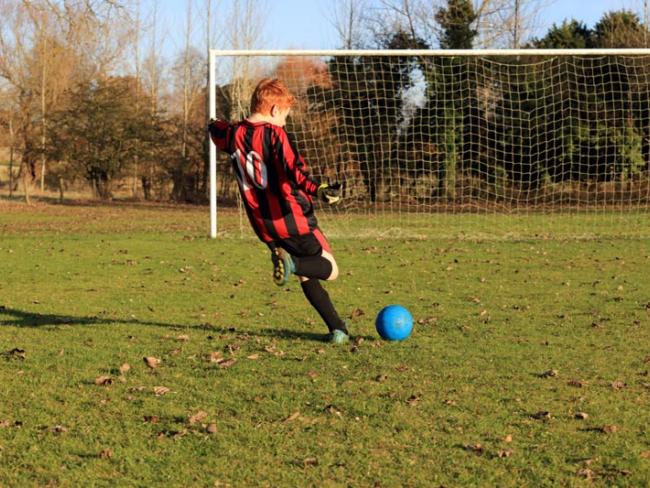
Football needs local pitches for games and practice. Dean Clarke/shutterstock.com.
Events at the King Edward VI Community College (KEVICC) in Totnes demonstrate the need for scepticism when purely economic arguments are put forward. Reported in April 2022 on social media and in the Totnes press, the college governors proposed selling off around 14 acres – half its playing fields – to fund repairs and maintenance.
Devon County Council said that it would cost £3.9 million to make the college buildings safe. Governors cited the contentious concept of Best Value in support of flogging off school land for housing.
Alternative
Totnes town council put in a bid for the field, with an impressive list of alternative ideas to benefit the community, including a centre for sports. The deputy mayor described the school authorities as “locked into a set of private sector dreams and fantasies”, dispelling a number of myths about the financial competence and trustworthiness of developers (whose practices include land banking).
A petition of over 5,000 parents and local people in April 2022 showed overwhelming support (91 per cent) for the council, and passion for their locality.
Meanwhile, owners of the freehold, the Dart Valley Learning Trust, part of Education South West (ESW), remained ominously unresponsive. Both they and the administrative borough of Torbay had a vested financial interest.
The KEVICC governing body was diminished in size to a small clique, reportedly with no parent members. Its business advisor was also the college finance director: a stitch-up was feared. Undisclosed to the community, they were in fact changing their articles of association, possibly in contravention of their own rules, in order to downgrade their obligations.
On 1 August 2022, in the middle of the campaign, the College became an Academy. An occupation of the school buildings took place on 15 December, to demonstrate alternatives to powerlessness, but bailiffs quickly intervened.
It is now the impact on health that remains Totnes’s strongest argument. New housing entails considerable extra traffic and pollution. The A385, which runs alongside, is a designated Air Quality Management Area, due to excessive nitrogen dioxide levels. It is used by children to walk to school.
A victory appears to be on the distant horizon. Campaigners were advised that ESW was not free to sell off land or buildings for private development. The DfE also raised hopes, saying: “No consent to any disposal of land has been granted at this time”. The Registrar of Companies House agreed to stop dissolution until a court hearing on 6 June 2023. Until then Totnes will not be resting on its laurels.
• Related article: Defending Britain’s open spaces
